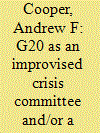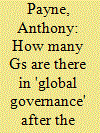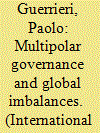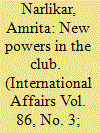|
|
|
Sort Order |
|
|
|
Items / Page
|
|
|
|
|
|
|
| Srl | Item |
| 1 |
ID:
096245


|
|
|
|
|
| Publication |
2010.
|
| Summary/Abstract |
The 2007-2008 global financial crisis encouraged speculation about the prospects for a 'Bretton Woods moment' in which the global financial system would be radically redesigned. Many of those hoping for this outcome have since become disillusioned with the limited nature of the international financial reform agenda. But the success and innovation of the Bretton Woods conference was made possible by unique political conditions that are not present today, notably concentrated power in the state system; a transnational expert consensus; and wartime conditions. Moreover, a close reading of history reveals that the Bretton Woods system did not emerge from a single moment but rather from a much more extended historical process. If a new international financial system is being born today, it will be a slower and more incremental development process that can be divided into four phases: a legitimacy crisis; an interregnum; a constitutive phase; and an implementation phase. Viewed from this perspective, post-crisis developments look more significant. The crisis of 2007-2008 has already intensified twin legitimacy crises relating to international financial policy and leadership. It has also generated an international reform initiative that has been unusual for its speed and internationally coordinated nature. Many of the details of this reform initiative remain unresolved and its content and breadth are hotly contested in various ways. We thus find ourselves in more of an interregnum than a constitutive phase. It remains unclear how quickly, if at all, the latter might emerge and in what form.
|
|
|
|
|
|
|
|
|
|
|
|
|
|
|
|
| 2 |
ID:
096253


|
|
|
|
|
| Publication |
2010.
|
| Summary/Abstract |
Arguably the most important catalytic effect of the 'Great Recession' of 2008-2009 has been the creation of the G20 at the leaders' level. As a form of improvised diplomacy the G20 merits extensive scrutiny, revealing as it does the degree of adaptation possible in the international system. The G20 links a significant ideational component, a new dynamic between established and emerging powers, and a complex set of issues. The innovative quality of the G20, however, rests on two very distinct strands of activity and tests of accomplishments. The G20 can be viewed as a 'recession-buster' with a vital but momentary purpose. Alternatively, the G20 can be taken to be an embedded 'steering committee' for the world. Both of these interpretations have validity. The crisis committee scenario highlights a technical regulatory-driven agenda. The steering committee scenario by way of contrast showcases the connection between the G20 and a new type of global settlement. Passing the test as a crisis committee hinges on very specific deliverables. Passing the test as a steering committee is even more demanding as any move toward a new state-specific 'concert' is highly contested. This article examines these debates, locating the G20 in a historical/comparative perspective and in terms of the wider context of shifting power structure at the beginning of the twenty-first century.
|
|
|
|
|
|
|
|
|
|
|
|
|
|
|
|
| 3 |
ID:
096252


|
|
|
|
|
| Publication |
2010.
|
| Summary/Abstract |
The G20 summit has recently emerged as the dominant agency of global governance. It claims that its economic weight and broad membership give it a high degree of legitimacy and influence over the management of the global economy and financial system. But the G20 still excludes from membership some 150 other countries, all of which have interests at stake within the contours of contemporary global governance. In the financial arena these excluded countries contributed significantly to the alternative agenda for dealing with the global financial crisis proposed by the United Nations conference that met in June 2009. In the trade arena they engaged extensively in a variety of coalitions within the World Trade Organization during the so-called Doha Round and played a part in preventing a deal emerging that was unsatisfactory from their perspective. Questions are raised about the legitimacy of the G20 by the active presence of so many other country voices outside its remit and it can be expected that the excluded 'G150' will increasingly explore different ways to engage with the members of the G20 over the next few years.
|
|
|
|
|
|
|
|
|
|
|
|
|
|
|
|
| 4 |
ID:
096246


|
|
|
|
|
| Publication |
2010.
|
| Summary/Abstract |
If the G's are the world's steering committee, the step from G7 to G20 deepened the democratic legitimacy of this committee. However, it also shifted influence to a group that share little else other than economic power: they have diverse experiences, challenges, cultural perspectives and starting points. This is particularly the case in the field of financial regulation, where action across these countries in recent months-despite all the language of global regulation-is increasingly local. The prospect of the new global being quite local has dismayed some. But it need not. This article challenges the dichotomy of more global versus more local. It argues that financial internationalism-greater cooperation by nations for the benefit of all-is better served by institutions that help to integrate diverse systems than those which try to enforce one-size-fits-all approach to very different economies.
International banks persuaded regulators of the benefits of home country regulation and a level playing field for bankers. But the benefits accrued largely to the banks in the boom and proved an avenue for contagion during the crash. Host country regulation may prove a safer way to regulate financial systems, in particular by allowing regulation to be more responsive to national economic conditions and cycles. It is likely that a shift back to host country regulation will act as a drag on international capital flows. The instinct of economists is that the cost of this is uncertain, suspect and conditional, especially when compared to the costs of financial crashes. Host country regulation does not mean there is no role for international institutions, such as the newly minted Financial Stability Board. Instead, it suggests a more nuanced role, potentially encompassing the policing of international market infrastructure, financial protectionism, information free flow between regulators and the convergence of regulatory principles and the consolidation of regulatory instruments. An informed and collegiate process of integrating different financial systems will be a more resilient system than one which tries to apply a single rule book across inherently different countries.
|
|
|
|
|
|
|
|
|
|
|
|
|
|
|
|
| 5 |
ID:
096249


|
|
|
|
|
| Publication |
2010.
|
| Summary/Abstract |
The deficiency of financial regulation and the presence of large macroeconomic global imbalances should be considered complementary interpretations of the global economic and financial crisis. The risk we face is that a new expansionary phase will bring back large and growing external imbalances, which will keep world growth on an unsustainable path. At the international level there is a classical 'collective action' problem to address since if export growth oriented strategies are pursued by all major countries they will generate a deflationary bias in world demand. This article explores how multilateral cooperation and international institutions can become reengaged with, and provides a meaningful device for addressing, these new issues and problems. It is necessary to restore shared rules of the game for international macroeconomic adjustment. This means endorsing a strengthened surveillance regime for the IMF in order to induce more compatible macroeconomic policies. In this regard, the IMF should have enforcement rule incentives and mechanisms, otherwise we are going to repeat past negative experiences where peer pressure did not produce significant results.
|
|
|
|
|
|
|
|
|
|
|
|
|
|
|
|
| 6 |
ID:
096251


|
|
|
|
|
| Publication |
2010.
|
| Summary/Abstract |
No good deed goes unpunished: the WTO's timely response to accommodate the new powers-Brazil, India and China-at the heart of its decision-making has produced new inefficiencies, has heightened its proclivity to deadlock, and has exacerbated disengagement and disillusionment among all its stakeholders. Particularly in the context of a major economic crisis, a reliable international institution is necessary to ensure the continued provision of freer trade-well-recognized as the route to recovery. With the WTO's recent record to provide these necessary public goods under doubt, where do the solutions lie? This article discusses the changing role of the new powers in the WTO, and further analyses the opportunities and challenges that these developments generate. The concluding section examines possible routes to reform. While very little can, or indeed should, be done to alter the balance of power itself, it is argued that appropriate institutional reform can help the multilateral trading system retain the advances it has made on grounds of fairness and further address the concerns of efficiency that are central to the crisis that it faces today.
|
|
|
|
|
|
|
|
|
|
|
|
|
|
|
|
| 7 |
ID:
096250


|
|
|
|
|
| Publication |
2010.
|
| Summary/Abstract |
This article examines the interaction between the emerging and traditional powers in global governance reform, and asks whether we are heading towards an international financial system that is more fragmented, where power is more diffused and national and regional arrangements play a more prominent role, at the expense of global multilateral institutions. It begins with a brief discussion of the global systemic and country-specific factors that motivate Brazil, China and other emerging countries to accumulate large currency reserves. We find that national arrangements for managing financial and currency crises will continue to hold sway for emerging countries in the wake of the global crisis. However, the actual capacity of regional arrangements in managing future financial crises is uncertain, and the significance of regional alternatives in the emerging architecture should not be overstated. The real capacity of East Asian regional arrangements to manage financial crises, payments problems or currency attacks is still untested, and key thresholds in multilateralization still lie ahead. In South America, multilateral lender-of-last-resort support inside the region is largely confined to the sub-regional level and is limited by Brazil's reticence. Enduring reliance on bilateral measures for financial crisis management is noted. Where there has been progress in regional solutions, since the global crisis, has been in the role of regional development banks in providing financing for developing countries to enact counter-cyclical policies. Such support also provides insulation for states in the region against the contagion effects of international financial crisis. We are in the midst of transitioning to a more diverse and multi-tiered global financial and monetary system. A reformed IMF could have a role to play in addressing global imbalances and encouraging a shift from national reserves to collective insurance, however, it would be preconditioned by significant shifts in the policy, lending operations, and internal governance of the Fund, and willingness among the G20 to strike a new consensus on how to deal with imbalances, and new accommodation on acceptable reserve levels.
|
|
|
|
|
|
|
|
|
|
|
|
|
|
|
|
| 8 |
ID:
096247


|
|
|
|
|
| Publication |
2010.
|
| Summary/Abstract |
A growing number of respected commentators now argue that regulatory capture of public agencies and public policy by leading banks was one of the main causal factors behind the financial crisis of 2007-2009, resulting in a permissive regulatory environment. This regulatory environment placed a faith in banks own internal risk models, contributed to pro-cyclical behaviour and turned a blind eye to excessive risk taking. The article argues that a form of 'multi-level regulatory capture' characterized the global financial architecture prior to the crisis. Simultaneously, regulatory capture fed off, but also nourished the financial boom, in a fashion that mirrored the life cycle of the boom itself. Minimizing future financial booms and crises will require continuous, conscious and explicit efforts to restrain financial regulatory capture now and into the future. The article assesses the extent to which this has been achieved in current global financial governance reform efforts and highlights some of the persistent difficulties that will continue to hamper efforts to restrain regulatory capture. The evidence concerning the extent to which regulatory capture is being effectively restrained is somewhat mixed, and where it is happening it is largely unintentional and accidental. Recent reforms have overlooked the political causes of the crisis and have failed to focus explicitly or systematically on regulatory capture.
|
|
|
|
|
|
|
|
|
|
|
|
|
|
|
|
| 9 |
ID:
096248


|
|
|
|
|
| Publication |
2010.
|
| Summary/Abstract |
Although the financial and economic crisis did not directly hit the international monetary system, it has lead to the rethinking of the overall architecture that underpins the world economy. Can the current system of floating currency blocs with dollar-based trade and reserves withstand the strains of the global adjustment ahead? It is time to consider alternatives. This article argues that the existing system needs to evolve into a multicurrency one in which a number of international currencies, ideally representing the main trading areas, have the function of storing value and providing the unit of measure. A multicurrency system would respond more flexibly to the demand for liquidity and would provide a way to diversify the accumulation of reserve assets. It is also more appropriate for the increasingly multipolar world economy.
The article discusses how in today's larger and more integrated world economy the dependence on the dollar as the basis of both trade flows and financial reserves has become excessive, creating some fundamental imbalances. However, while the rationale for change is clear, the current system is locked in a form of stable disequilibrium where the status quo carries the lowest risk for most players in the short-term. Any abrupt move away from the dollar could trigger trade flow disruption and exchange value losses. Policy cooperation should keep the imbalances under control and manage the transition to a more stable system. The system will evolve, albeit gradually. Looking at the steps taken by some countries, notably China, there is the gathering impression that this decade is one of transition, rather than a 'Bretton Woods moment'. Any reshaping will have to bring in the views of the 'rising powers', China in particular, and their concerns about the limitations of the existing system and the increasingly asymmetric burden of adjustment that it imposes.
|
|
|
|
|
|
|
|
|
|
|
|
|
|
|
|
|
|
|
|
|